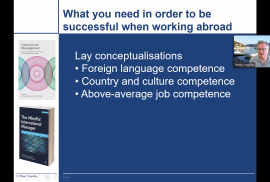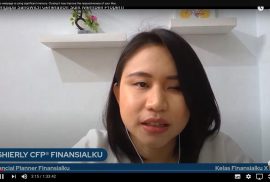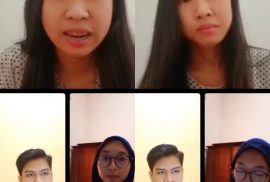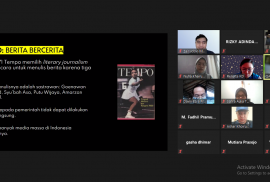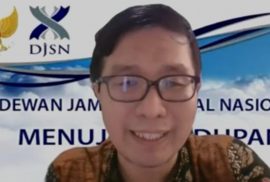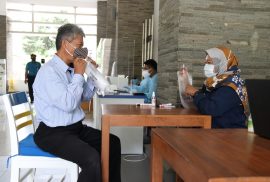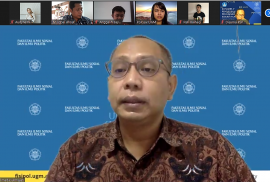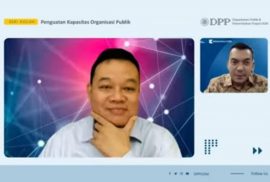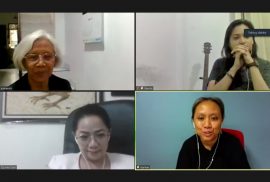In his session, Peter Franklin conveyed the intricacies of working abroad. According to Franklin, cultural complexity is one of the things that needs to be considered when we want to work in a place with different rules. Things such as norms, practices, and behavior must be considered so that we can cooperate in working abroad. We also need to pay attention to the foreign language skills we have, so that we can easily be dynamic when working. Responding to the many things that must be mastered, Franklin stated, “Working abroad is very challenging.”
News
Yogyakarta, June 4th 2021━Social Entrepreneurship of UGM together with Finansialku.com held a class entitled “Why is it Difficult for the Sandwich Generation to Buy property?” on Friday (4/6). The speaker at this event was Shierly, S.E., MBA., CFP, as the Financial Planner of Finansialku. The event took place on the YouTube channel of Finansialku.com at 02.00 p.m. to 03.30 p.m.
Sandwich generation is a generation of adults who are squeezed and have to bear the financial burden of a generation of parents and children (Dorothy Miller, 1981). The term sandwich generation is used to refer to the people who not only bear their own lives, but also bear the life of the generations below them and or above them.
Yogyakarta, June 4th 2021━In order to carry out activities in the field of education and socialization related to sexual violence, the FISIPOL Crisis Center held the second FCC Talk in collaboration with LPPM Sintesa on Friday (4/6). Titled as “Not an Ordinary Man: Toxic Masculinity and the Role of Men in Creating Safe Spaces on Campus”, this second FCC Talk was hosted by three speakers, they were Puspa and Yosep from the Education and Socialization Division of the FISIPOL Crisis Center, and Arum from the Division of Internal Development of LPPM Sintesa.
Yogyakarta, June 3rd 2021━Department of Communication Science (Dikom) of UGM held a practitioner lecture of the Literary Journalism course titled as Telling Stories in the Digital Age: Peeking from the Perspective of Literary Journalism (03/06). This practitioner lecture invited Qaris Tajudin, the Director of Tempo Institute, as the speaker and was attended by the students who specialize in Journalism.
Tempo is a media pioneer in the practice of literary journalism in Indonesia. At the beginning in 1971, the workers at Tempo were generally artists or writers. Tempo is also only produced weekly, so they accentuate the entertainment aspect of the news and put the speed aside. Literary journalism also becomes a solution to criticize the government which we can’t do directly.
Yogyakarta, May 31st 2021━The Department of Social Development and Welfare (PSdK) FISIPOL UGM held another SoDeT (Social Development Talks) webinar on Monday (31/5) morning. On this occasion, the topic is “A Peek to Indonesia’s Social Security Program” with Muttaqien MPH., AAK., as the Vice Head in the National Social Security Council General Policy Commission. The event was held through a Zoom meeting on 10.00-12.00 WIB and was moderated by Kafa Abdallah Kafaa, S.Sos., M.A., a lecturer in PSdK FISIPOL UGM.
Yogyakarta, May 17th 2021━The Faculty of Social and Political Science (Fisipol) UGM through the Wellness Center (WLC) facility held a mass GeNose C19 test for all Fisipol UGM education staff on the first day after the Eid holiday. The Covid-19 screening that is done simply through exhaling will be held for two days which spans from 17th to 18th May 2021 in the West Wing of Fisipol UGM.
The Head of Finance Administration of Fisipol UGM, Uling Sumbogo, said that the GeNose C19 test is aimed to detect and prevent the Covid-19 spread among 110 Fisipol UGM Education staff. In one day, around 50 people will be tested through three sessions from 08.00 a.m. to 13.00 pm. “The schedule for this test is adjusted with people who are currently working from their office, but there are some who need to adjust because this test will only be held for two days,” said Uling.
Yogyakarta, May 10th 2021━On Monday (10/05/21), PolGov released a research about the controversy of The Valentine’s Day ban in Indonesia by partnering with KU Leuven in Belgium as the research partner. The partnership between PolGov and KU Leuven is centered on issues of toleration and this year is their last year of partnership. The release of the Big Data analysis is started with an exposition of the research results from PolGov researcher, Anggalih Bayu Muh Kamin, and Dian Nuri Ningtyas as the Project Manager of the Partnership between PolGov and Ku Leuven.
Yogyakarta, May 7th 2021━Still with the spirit of Kartini Day and Earth Day that was celebrated last April, Social Research Center or Sorec of the Department of Sociology of UGM came back with another monthly discussion to celebrate those two momentums on Friday (7/5). Entitled Ecofeminists in Indonesia: Protecting, Caring, and Fighting for the Future, this discussion presented two experts to address environmental and women’s issues from different perspectives; theoretical and practical perspectives.
Starting his session, Silmy Karim gave a little intermezzo which at the same time spurred quite an inspirational spirit. In his speech, he revealed that it is important for us to have a principle that we must be able to become competitive people. This principle is also a belief that he holds, as an effort to be able and motivated by global competitiveness. As a CEO with tens of thousands of employees, Silmy explained that in a career it is very necessary to be concerned with the organization. It means the ability to choose the right person, the right system, the right coaching method, and efforts to strengthen the capacity of the right public organizations need to be considered in order to further become harmony which can directly change an organization.
Yogyakarta, April 30th 2021━According to the data of Damai Pangkal Damai (DPD), there have been more than fourteen thousand nonviolent actions that have occurred in Indonesia since 1999. Based on this data, the DPD together with the Institute of International Studies (IIS) of FISIPOL UGM held a Webinar on Nonviolent Resistance in Indonesia entitled “Whoever leaves violence …” on the last Friday (30/4). The event featured representatives from several movements and organizations in Indonesia that rely on nonviolent resistance strategies. The speakers that presented in this event were Maria Catarina Sumarsih as the representative of Aksi Kamisan (Kamisan Action), Djuwita Djatikusumah from indigenous Sunda Wiwitan community, and Gendis Syari that represented Gejayan Memanggil. On this occasion, Dr. Diah Kusumaningrum as the lecturer of the Department of International Relations of FISIPOL UGM, presented as the moderator.

